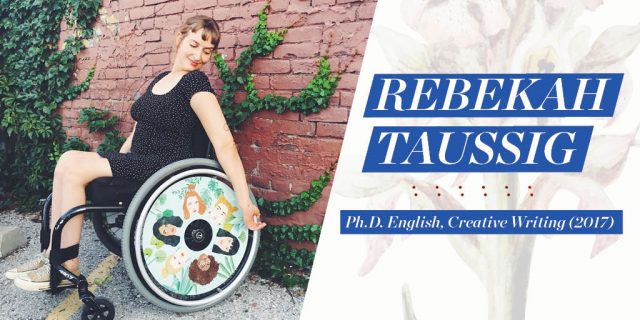
Disability is often viewed through a distorted lens, with stories of disability perpetuating oversimplified images of either tragedy or inspiration. This treatment is easy to become accustomed to but falls painfully short of reality, trading complexity and nuance for convenient, easily digested fiction. So Rebekah Taussig is rewriting the story. And through her work in creative nonfiction and disability studies, she’s changing the conversation about disability by seeking to tell stories about bodies with vibrancy, curiosity, and honesty.
Meet Rebekah, who earned a Ph.D. in creative writing from KU’s Department of English in 2017, and discover what she has to say about teaching and learning, crafting “mini-memoirs” on her website and Instagram, setting realistic expectations, and telling stories that matter.
Where are you from, and why did you decide to come to KU?
I’m from Kansas City, and I decided to attend KU for a number of reasons, one of which was that the professors in my M.A. program at UMKC had wonderful things to say about the English faculty at KU. In addition, KU’s English department is one among a few to offer a Ph.D. in creative writing.

What is one thing you think everyone should know about your research or research interests? This might be a commonly held belief that your research questions or complicates.
Within the creative writing program, I focused my work on disability studies and creative nonfiction. As a woman who grew up using a wheelchair to navigate life, disability studies was a planet-flipping discovery for me. Disability studies shifts the default focus from the disabled body itself to the structures and systems that disable that body (e.g. instead of identifying a wheelchair user as the problem that needs to be fixed, disability studies shines the spotlight on the stairs that bar their entrance and strives to include more points of access, like ramps or elevators). Using this lens, my work examines the relationship between the stories we tell about disability and the world we live in, from physical spaces and economic opportunities to social roles and interpersonal relationships. I believe thinking critically about disability and listening to the stories of those who embody it has the power to prompt more curious, imaginative, and inclusive communities.
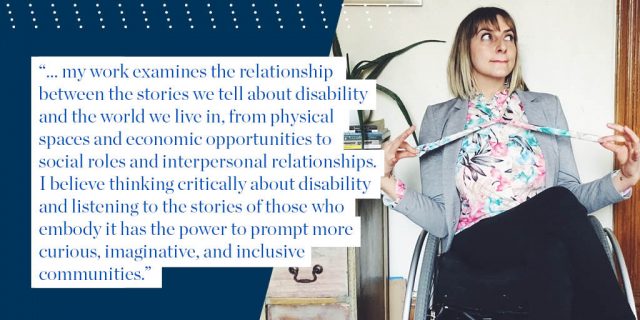
What advice would you give students applying for research funding opportunities?
Getting involved with the Hall Center for the Humanities was one of the most productive choices I made for making connections and learning about exciting opportunities.
Tell us a bit about your website, rebekahtaussig.com, and Instagram profile @sitting_pretty? What is the central focus of your work on these platforms, and what do you hope to achieve through these?
About four years ago, I started the Instagram account where I regularly craft “mini-memoirs” that explore what it means to live in my particular (crippled, female) body. Through my studies, I became more aware of just how little disability representation there is in media. The images of disability we do have are so often distorted — oversimplified into tragedy or inspiration. Growing up, this felt normal. I assumed that I didn’t see any images of vibrant, complicated women with disabilities, because they didn’t exist. This lack of dynamic representation has proven to be powerfully destructive for many both in and outside of the disability community, and I have all of us in mind when I create content. Erasing and warping stories of disabilities harms all of us, and through this platform, I strive to participate in rewriting the stories we tell about bodies.
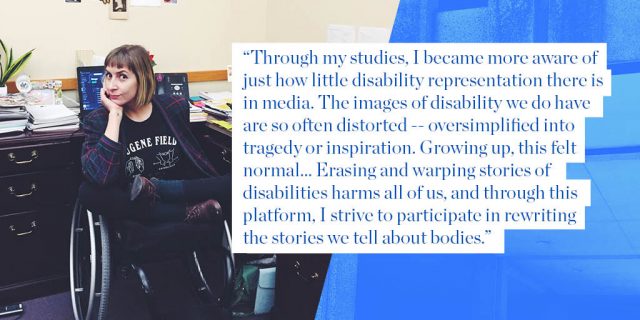
What accomplishments are you most proud of?
I’m proud of the community I’ve been able to foster online. As soon as I joined this space, I realized that we are hungry for voices to narrate experiences that have been dismissed for so long. I am one voice among many in this space, searching for words, images, and stories to add distinct flavors and textures to the experience of disability. There are very few human interactions as powerful as finding someone who truly gets it — who understands the very thing you were convinced made you entirely Other. I’m grateful to be a part of this work.
What is the benefit of being in the KU College alongside students studying sciences, arts and humanities?
During my time at KU, one of my favorite programs was the Hall Center for Humanities Disability Symposium series. Each month, a scholar doing work within disability studies presented on their latest research. I remember some of the most exciting projects and connections coming from folks in the School of Education, American Studies, Linguistics, Social Psychology, and so on. These people and their ideas brought rushing fresh water into my own work in ways I couldn’t easily replicate.
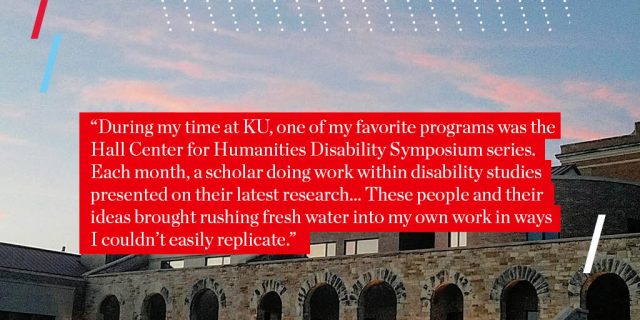
Give a shout-out to a professor, mentor, advisor, or someone at KU who has helped you?
Laura Moriarty changed my entire experience at KU. She was the professor who genuinely saw me, not just as another student in her class, but as a whole person and a writer. I will always remember sitting in her office during a moment of crisis (What am I even doing here? Maybe you’re familiar with this particular brand of grad school distress?) In my moment of panic, she was able to see through the loud, cluttered anxiety and actually help me visualize the project I was there to create. I cannot thank her enough for seeing me as a writer with something to say before I was able to see it myself.
What would you tell your freshman self?
Don’t forget why you are here. What do you actually care about? What do you want to learn? What do you hope to build, create, contribute? You will make space to cultivate these desires when you allow yourself to ask questions, explore, take risks, let go of doing and being everything to everyone, let the less important things slide, and sometimes even look a little foolish in the process.
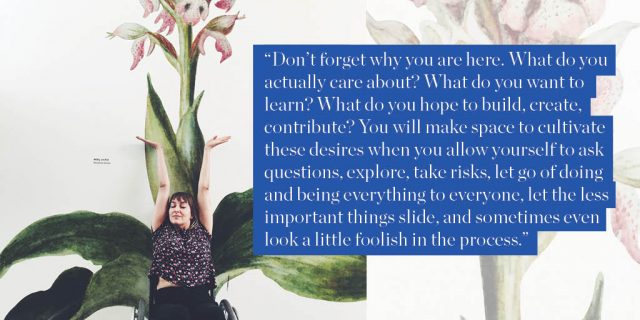
It’s so easy to get swept up in being a Graduate Student — in confidently affirming that you totally get every reference and name drop, in aiming to add the weightiest insights into every seminar discussion, in having the most publications, the most powerful connections, the greatest job prospects, the longest CV. Genuine learning, growth, and creativity don’t mix well with these rigid, impossibly high expectations. There are plenty of things that will try to grab your attention, your energy, your brain space, but those aren’t the things you’ll hold onto when you leave. Pay attention to the work that makes your eyes light up, and always go after that.
What are you doing now, and what are your future plans?
Right now, I am teaching high school English at an independent school in Kansas City. While I don’t cherish the never-ending pile of grading (although, at this point, can I even imagine a life without a stack of papers that need grading? who would I be without writing a steady string of marginal comments that beg for clarity and precision?), I do treasure the daily opportunity to create spaces where students can encounter new ways of thinking, approach the world with a critical lens, and learn. In the spaces between the classroom and the grading, I’m working on a book that brings the theory of disability to life with personal stories.
What motivates you?
I write and teach, because I want to understand. There is so much about living life on this planet that baffles, intrigues, and mystifies me. Reaching for language, collaborating with a group of thinkers, telling and sharing stories, looking for patterns and points of connection — these are the tools that help me navigate the unknown I long to see.
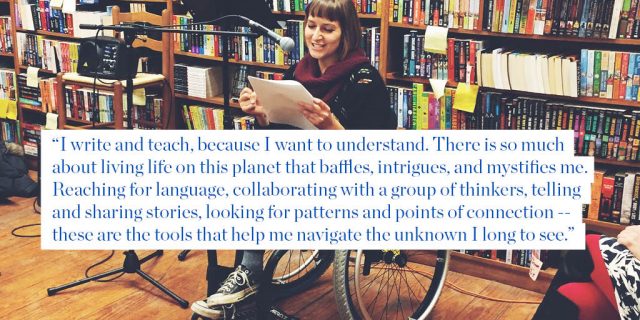
Be like Rebekah. Tell a story that matters, be an advocate, and don’t lose sight of the things that are truly important. For more, visit the Department of English and the Hall Center for the Humanities at the University of Kansas. Also, check out more from Rebekah on her website and Instagram profile.